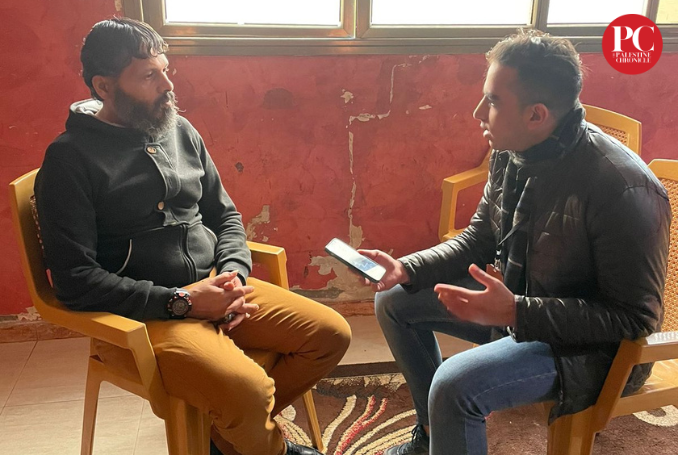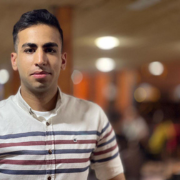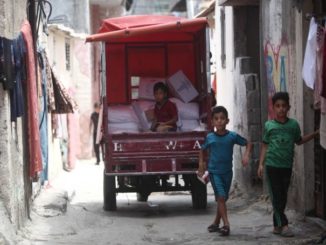
The nightmare of Asaad Baker’s immigration experience still continues to haunt him after the agonizing journey he had to endure.
Assad Baker, 44, struggled to live in besieged Gaza due to the difficult economic conditions and lack of job opportunities. For years, he could not find any work. Prior to that, he worked as a seamstress, before being forced to quit due to debilitating back pain.
Israel has long been imposing a suffocating siege on the Gaza Strip since 2006, which has worsened an already high unemployment rate. According to the Gaza Ministry of Labor in 2022, the unemployment rate has reached 47% in the Strip, increasing to 74% among the youth.
Amid the harsh reality in Gaza, the unemployed Assad became fed up with the miserable living conditions, so he sought help from a local smuggler, Abed Alnaser, to leave the region.
The idea of resorting to illegal immigration first came to Asaad’s son, 21-year-old Deib. Both father and son hoped to improve the economic situation of their family.
“I work in a coffee booth. I get 20 shekels per day (approximately $5,50). This is not enough for home needs or a business license. So, I told my father that I wanted to emigrate, but he refused,” Deib said.
Asaad decided it would be safer for him to emigrate instead of his son. “Emigration is like gambling. It may succeed or fail, but the majority of the time it is a failure, so I did not want my son to run that risk. For me, emigration was hope, despite all the dangers. I was just looking for a glimmer of hope,” he explained.
In exchange for transportation to Italy on a migration boat, the father agreed to pay the smuggler $7,000. The first $3,000 was to be paid in Gaza, and the rest to be paid upon arrival in Italy.
Asaad decided to incur the debt, hoping to repay it once he found employment in Italy. “I immigrated to gain access to the outside world because we are besieged and no one can hear our voice and our children’s voice because of the oppression,” Assad said.
Journey of Hope
On the 27th of February, 2022, the father of six left Gaza in search of a better life for his children, so as to provide them with a steady source of income. He traveled to Egypt and Libya, ultimately hoping to reach Italy safely. Assad was accompanied by his brother, Mahmoud, and his nephew, Mohammad.
After staying for a week in Egypt, he arrived illegally in Libya and stayed there another 9 months. Then, despite the smuggler’s promise to provide a reliable boat to Italy within ten days, Asaad had to wait another four months. This left him confused and frustrated.
“I had to be constantly moving from one place to another since I was an illegal refugee there,” Assad explained. He lived in harsh conditions, moving from garage to garage, instead of living in a safe house as promised by the smuggler.
When the first trip took place in May 2022, there were 58 people on it. They were all crowded onto a boat with a capacity to hold a maximum of 15.
The boat had two engines, which were barely working. After the first 20 minutes of sailing, one engine stopped working, causing the boat to move even slower. After another 100 kilometers, the second engine stopped, stranding the boat in the middle of the Mediterranean Sea.
“I found myself among the darkness, surrounded by dark water in every direction. The only sounds I heard were of people breathing and the sea roaring .. what will happen to me, my family, and my children?”
During this period, the migrants spent five hours at sea awaiting help. The five hours they spent were full of fear and anxiety. The stress pushed some of them to even jump off the boat and try to swim in no specific direction.
Assad tried to repair the boat’s engines, to no avail.
“We waited in the sea for five hours until the Libyan Coast Guard arrived and arrested us all,” he continued. He was thrown in jail for 12 days.
“We were treated well in the Libyan Coast Guard prison, as they made a recorded call of our voices and sent it to our family for reassurance,” he said.
The Kidnapping
The Libyan government made an effort to return the Palestinian immigrants to Palestine. However, a smuggler intervened and took Asaad and a number of the others out. They were then kidnapped by a mafia crime group in Libya.
At first, the smuggler prepared a garage for them to reside in under the pretext of securing a second immigration trip to Italy for them. As a result, the immigrants became bait for smugglers and other criminal gangs.
“I was kidnapped for 10 days and kept in a place not suitable for humans. My eyes were blindfolded. The place was dirty and smelled of filth, and there was only one loaf of bread provided each day, just enough to keep me alive. My psychological and health conditions rapidly got worse. I also did not know where I was or who had kidnapped me.”
Assad spent all of these days in complete isolation, with no contact with his family or anyone outside of their prison. All of their personal belongings and phones were stolen by the gang.
The gang eventually reached a deal with Assad’s family through the smuggler, to release Assad in exchange for a thousand dollars. The family paid the ransom.
After he was released, Asaad had to wait another month and a half before embarking on a second attempt to reach Italy. This time, the smuggler promised him and 14 other Palestinians a safe journey all the way.
A State of Confusion
The conditions that Asaad was living in Libya were extremely difficult, as he was an illegal resident. He moved from one place to another, and was subject to further extortion by the smuggler.
“Because of my status as an illegal resident of Libya, I was always on the move for fear of being caught by the police or gang members of the mafia,” Assad said.
But despite the risk of death that he still faced, Assad was compelled to continue on the migration path, believing he had no other choice.
As the smuggler prepared for their second attempt, Assad was hopeful that this trip would improve his situation and that of his entire family after he arrived in Italy.
“On October 2, 2022, along with 14 other men from Gaza, I was placed in a dark warehouse, waiting for the smuggler to return. We slept in the warehouse. When I awoke on the second day, I was shocked to discover that only I and two others remained, the others had all left,” Asaad said.
In the aftermath of the smuggler leaving, Asaad was in a state of confusion. He lost contact with the smuggler. He could not communicate with anyone, including the young men who were previously with him.
Returning to Gaza
Asaad escaped the warehouse and reached the Palestinian Embassy in Libya to tell them of the other 11 missing men. For a week, he could not obtain any information on any of the 11 men, including two close family members, his brother, and his nephew.
“I left Libya without even going back through the Palestinian Embassy. I had left Gaza just hoping to improve our living conditions, but instead, I ended up jumping from a frying pan into a fire.”
“After 9 months of agony, I returned to Gaza. As I met with my family, I was filled with both sadness and joy.”
The reason Assad was happy was that he had moments in Libya when he thought he would never see his family again. Assad was also heartbroken because he had to return alone without his brother and nephew.
“I did not expect my trip to be like this,” Asaad said. “The smuggler told me that we would have traveled to Italy on two safe and reliable boats, but the reality was entirely different.”
“Initially, the smuggler and I agreed to a $7,000 fee before I left Gaza. In the end, I paid more than $10,000 and I never reached Italy. I was forced to pay the smugglers anyway. My family is now in debt because of me.”
Lost at Sea
According to the Council on International Relations in Palestine, more than 60,000 young people” have also emigrated from Gaza. Dozens of them have died on their way to freedom and many others are still unaccounted for.
The Euro-Med Human Rights Monitor reports that since 2014, 378 people have died or gone missing during their attempt to migrate from Gaza.
Today, Asaad’s family is still waiting for the return of their two sons, Mohammed and Mahmoud. So far, no organization or government has helped the Asaad family discover the fate of these missing men.

– Mahmoud Mushtaha is a Gaza-based freelance Journalist and translator. WANN contributed this article to The Palestine Chronicle.







